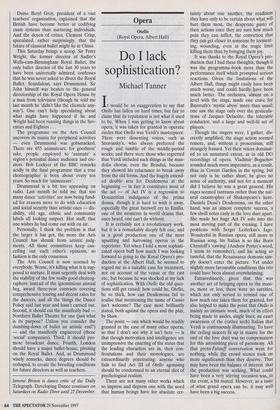Opera
Otello (Royal Opera, Albert Hall)
Do I lack sophistication?
Michael Tanner
It would be an exaggeration to say that Otello has fallen on hard times, but fair to claim that its reputation is not what it used to be. When I was getting to know about opera, it was taken for granted in operatic circles that Otello was Verdi's masterpiece. There were dissenting voices, such as Stravinsky's, who always preferred the rough and tumble of the middle-period works; and there were those who regretted that Verdi included such things as the man- dolin chorus, even the Brindisi, because they showed his reluctance to break away from the old forms. And the hugely extend- ed double aria for Desdemona at the beginning — in fact it constitutes most of the act — of Act IV is a regression to Donizettian indulgence of the prima donna, though it is hard to wish it away, especially the great farewell cry to Emilia, one of the moments in world drama that, once heard, one can't do without.
It is certainly not a revolutionary work, but it is a remarkably deeply felt one, and in a good production one of the most upsetting and harrowing operas in the repertoire. Yet when I told a most sophisti- cated opera buff how much I was looking forward to going to the Royal Opera's pro- duction at the Albert Hall, he seemed to regard me as a suitable case for treatment, not on account of the venue or the cast etc., but because he was shocked at my lack of sophistication. With Otello the old ques- tions still get raised: how could he, Otello, be so thick, how can Desdemona fail to realise that mentioning the name of Cassio isn't welcome? The case most brilliantly stated, both against the opera and the play, by Shaw.
The point — one which would be readily granted in the case of many other operas, so that I don't see why it isn't here — is that though motivation and intelligence are unimpressive the enacting of the states that the leading characters are in, their con- frontations and their monologues, are extraordinarily penetrating: anyone who fails to find Act III of Otello agonising should be condemned to an eternal diet of psychological realism.
There are not many other works which so impress and depress one with the need that human beings have for absolute cer- tainty about one another, the readiness they have only to be certain about what will hurt them most, the desperate gusto of their actions once they are sure how much pain they can inflict, the conviction that they can get closer to someone by torment- ing, wounding, even at the tragic limit killing them than by bringing them joy.
It was thanks to the Royal Opera's pro- duction that I had these thoughts, though it was the programme-book more than the performance itself which prompted serious reactions. Given the limitations of the Albert Hall, things might easily have been much worse, and could hardly, have been much better. The orchestra, almost on a level with the stage, made one crave for Bayreuth's 'mystic abyss' more than usual; one saw the stage only over the gesticula- tions of Jacques Delacote, the tolerable conductor, and a large and well-lit set of players.
Though the singers were, I gather, dis- creetly amplified, the stage action seemed remote, and, without a proscenium, still strangely framed. Yet their voices dominat- ed to an unnatural extent, as in old DG recordings of opera. Vladimir Bogachov sounded much more impressive, as a result, than in Covent Garden in the spring, but not only is he rather short, he gives no sense of authority, and not for a moment did I believe he was a great general. His rages seemed tantrums rather than the nat- ural catastrophes of Shakespeare's hero. Daniela Dessi's Desdemona, on the other hand, was an almost complete success, a few shrill notes early in the love duet apart. She made her huge Act IV solo into the most moving part of the evening. I have problems with Sergei Leiferkus's Iago. Wonderful in Russian opera, still more in Russian song, his Italian is so like Boris Christoff's 'cawing' (Andrew Porter's word, I seem to remember), and his acting so tasteful, that the Renaissance demonic sim- ply doesn't enter the picture. Yet under slightly more favourable conditions this trio could have been almost overwhelming.
Extraordinarily, given that this was another act of bringing opera to the mass- es, more or less, there were no surtitles, which not only served to remind one of how much one takes them for granted, but also helped to make the point that Otello is mainly an intimate work, much of its effect being made in asides, single lines, an exact awareness of the (rather arch) Italian that Verdi is continuously illuminating, To have the ceiling saucers lit up in mauve for the end of the love duet was no compensation for this astonishing piece of parsimony. All that proto-Falstaff conversation went for nothing, while the crowd scenes took on more significance than they deserve. That may have been the balance of interest that the production was seeking.. What could have been a very stirring occasion was, in the event, a bit muted. However, as a taste of what grand opera can be, it may well have been a big success.


















































































 Previous page
Previous page